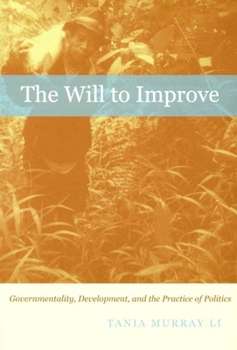The Will to Improve: Governmentality, Development, and the Practice of Politics
Select Format
Select Condition 
Book Overview
The Will to Improve is a remarkable account of development in action. Focusing on attempts to improve landscapes and livelihoods in Indonesia, Tania Murray Li carefully exposes the practices that enable experts to diagnose problems and devise interventions, and the agency of people whose conduct is targeted for reform. Deftly integrating theory, ethnography, and history, she illuminates the work of colonial officials and missionaries; specialists...
Format:Paperback
Language:English
ISBN:0822340275
ISBN13:9780822340270
Release Date:May 2007
Publisher:Duke University Press
Length:392 Pages
Weight:1.20 lbs.
Dimensions:0.9" x 6.5" x 9.0"
Customer Reviews
2 ratings
A few more comments
Published by Thriftbooks.com User , 16 years ago
In characteristic style, Gene Anderson has written a great review of a great book. I would add (having read ch. 1-6)--along the lines of his comments on Foucault and Weber at the end--that this book draws upon Ferguson's Anti-Politics machine, and shares some of its shortcomings (see Lipton's review in Development Southern Africa ca. 1992): the accounts of the "developers" rest heavily upon a reading of official documents. Li points out repeatedly that conservation interventions avoid confronting the shortage of agricultural land, and thus "render technical" a set of political questions, but I'd like to hear--in the words of development planners--why they avoid the land issue, and how they justify this omission. Li provides great examples of speaking with villagers about the various interventions put in place, but rarely treats development workers in the same way -- they primarily appear through their documents, rather than as positioned social actors in the field. This asymmetry is frustrating -- it's understandable when she's dealing with historical material, but I had hoped the contemporary ethnography would be less textually-focused in its treatment of "developers."
Development Messes Up Again
Published by Thriftbooks.com User , 16 years ago
This book is a stunning job of tracking yet another case of failed development. The main ways this book differs from a long, long literature on such matters are, first, that Li provides a long history (going back through the centuries of colonialism), and, second, that she gives an extremely detailed account of the political processes that led to stagnation in rural Sulawesi over the last 10+ years. A national park to preserve biodiversity, various agricultural projects, and a lot of untapped local potential for top-quality coffee and cocoa exports did not add up to success. In addition to presenting a superb job of reporting, Li writes clearly and straightforwardly, without undue social-science jargon. The problem was the same old one that we have seen in literally thousands of similar case studies: people with "the will to improve" but not the common sense to listen to what the local communities actually think and want and need. Everybody, from the Dutch of colonial times to the NGO's of today, "knows what's best" (shades of Alice Miller and her revealing the sinister side of "for your own good"). What's best often bears a strange resemblance to what's best for the rich developers rather than what's best for the locals. As indigenous people around the world describe the improving enterprise, "We had the land and they had the Bible. Now we have the Bible and they have the land." Li is generous to the change agents--the colonial missionaries and developers, postcolonial government agents, and international development banks and conservation agencies. She credits them with a genuine desire to do good. Maybe it's just because I'm older and have seen more, but I suspect something else. It seems odd that all the mistakes are in one direction--i.e., to increase the wealth and power of the change agents or their backers. Li does point out the role of both power games and unthinking prejudice against the poor, the uneducated, and the rural. Few people who have not lived and worked with rural Third World families know just how extremely sharp, competent, and aware these families are. Their poverty is the result not of their incompetence but of centuries of oppression and disease. There are some limits to this book. I am not complaining--the book is long and detailed, and nobody can cover everything. Still, further work on the problems of Sulawesi is needed. First, there is little biology herein. The desperate need for conserving Sulawesi's biodiversity--its highly endemic flora and fauna--does not come through. The people were displaced from the national park, because of oppressive government and incredibly inept conservation NGO efforts; obviously, they had been coexisting with the biodiversity for at least 60,000 years, and may even have created a lot of it (there has been plenty of time for coevolution here). So somebody should have been working with them to find out what they were doing right, and then







